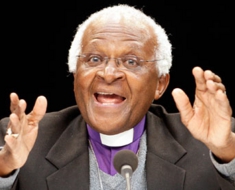 “If you are neutral in situations of injustice, you have chosen the side of the oppressor. If an elephant has its foot on the tail of a mouse and you say that you are neutral, the mouse will not appreciate your neutrality.”
“If you are neutral in situations of injustice, you have chosen the side of the oppressor. If an elephant has its foot on the tail of a mouse and you say that you are neutral, the mouse will not appreciate your neutrality.”
-BISHOP DESMOND TUTU
Bishop Desmond Tutu is a Nobel laureate who helped overcome Apartheid in South Africa. He was the first black Bishop of Johannesburg and Archbishop of Cape Town, and for most of his life has served as the “voice of the voiceless” who have suffered from racial discrimination in South Africa. He is well known for his international campaigns to battle HIV/AIDS and poverty, and is the chairperson of The Elders, an independent group of eminent global leaders who offer their collective influence and experience to support peace building, help address major causes of human suffering and promote the shared interests of humanity.
Bishop Tutu was born in 1931 in Klerksdorp, in the South African state of Transvaal. He initially trained as a teacher and in 1954 graduated from the University of South Africa. After three years as a high school teacher, he began to study theology. He earned his Bachelor’s degree in divinity as well as his Master’s degree in theology from King’s College London.
For several years, Bishop Tutu taught in South Africa before returning to England to serve as Assistant Director for the World Council of Churches in London. In 1975, he was appointed Dean of St. Mary’s Cathedral in Johannesburg, the first black leader to hold that position. From 1976 to 1978 he served as Bishop of Lesotho, and in 1978 became the first black General Secretary of the South African Council of Churches.
Gaining national and international attention, Bishop Tutu advanced nonviolent resistance to the Apartheid regime in South Africa, and encouraged the application of economic pressure by countries dealing with the government. He called for equal rights for all South Africans and a system of common education, repeal of the oppressive passport laws, and an end to forced relocation. For his critical efforts to restore human dignity, fraternity and democracy to South Africa, Bishop Tutu was awarded the Nobel Prize for Peace in 1984. Two years later, he was elected Archbishop of Cape Town and became first black African to serve in this position, which placed him at the head of the Anglican Church in South Africa.
After South Africa’s first multi-racial elections in 1994, President Nelson Mandela appointed Bishop Tutu to chair the Truth and Reconciliation Commission. In that capacity, he investigated the human rights violations of the past four decades, and counseled forgiveness and cooperation, rather than revenge for past injustice. In 1996 he retired as Archbishop of Cape Town and was named Archbishop Emeritus.
In 2007, Bishop Tutu joined former South African President Mandela, former U.S. President Jimmy Carter, retired U.N Secretary General Kofi Annan, and former Irish President Mary Robinson to form The Elders, a private initiative mobilizing the experience of senior world leaders outside of the conventional diplomatic process. As Chair of The Elders, Bishop Tutu has traveled to Darfur, Gaza and Cyprus in an effort to resolve long-standing conflicts.
In 2009, Bishop Tutu’s many historic accomplishments – and his continuing efforts to promote peace in the world – were formally recognized by the United States when President Barack Obama awarded him the nation’s highest civilian honor, the Presidential Medal of Freedom.
